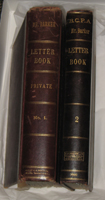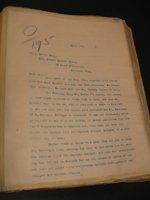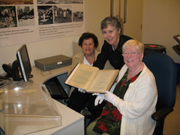Barker Letter Books
The Barker Letter Books were donated to the City of Richmond Archives by British Columbia Packers Limited in 2001. These letters have been transcribed and are now available online.

Bound Volumes
In this era, copies of outgoingcorrespondence were glued in a
register, with an index in the front.
W.H. Barker
William Henry Barker, born in Manchester, England in 1853, joined the British Columbia Packers' Association in October, 1904 as General Manager. It was the beginning of a 22-year career with the company of which he later became President. He was succeeded in this office by Æmilius Jarvis to whom many of Mr. Barker's letters are directed.
Before coming to British Columbia Mr. Barker had been Superintendent of Canneries for the Columbia River Packers' Association and, after 1901, involved in a cannery on Puget Sound. He died in 1929.
The Fishing Industry
The letters chronicle revolutionary changes in the fishing industry in British Columbia: machines replaced hand-labour; new technology in the manufacturing of cans improved safety and reduced labour costs; engines replaced oars in fishing boats; and the regulation of the fishery by the Canadian government became more restrictive and comprehensive.
It was also a time of growth and expansion for the company. The British Columbia Packers' Association acquired canneries and plants, and other fishing companies becoming in 1921 the British Columbia Fishing & Packing Company. It was not until 1928 that British Columbia Packers Limited was formed -- the company name with which we are most familiar today.
The Letter Books
The Barker Letter Books were compiled between 1905 and 1926. They consist of the outgoing correspondence of Mr. Barker. The letters were typed on company letterhead with a carbon copy on onion-skin paper. It is the copy that has been pasted in the Letter Books and preserved by British Columbia Packers Limited.
The paper was of poor quality to start with, and has deteriorated with age. Every turn of a page and flash of light shortens the life of a document so it was decided to reduce exposure of the fragile paper to the elements by transcribing the contents into a searchable database.

Sample Page from Letter Book
The onion-skin copy paper is so fragile that access to the Barker Letter Books is restricted for conservation reasons.The Transcription
Almost all of the letters were typed. This is a good thing as the few letters and comments Mr. Barker wrote in his own hand are very difficult to read. The volunteers and staff poured over the faint, scrawled hand-writing arriving at joint decisions about what words and phrases might be. Occasionally we were forced to give up and insert the comment, "illegible."
Sometimes the carbon paper was not changed often enough to make an entirely readable copy which, again, called for more oversight. We left in the spelling of that era -- cohoe for coho is one example -- and repeated Mr. Barker's punctuation which is often different than in today's usage.
The Letters
The courtly language of the business letters of that era charmed us all -- "Your esteemed favour of the 9th inst., received and contents read with interest." (Dec. 13, 1905)
The Volunteers
When the decision was made in 2002 to proceed with copying the books, the search began for computer-literate volunteers who would care for the valuable records and provide transcription skills. Retired elementary school teachers Carole Farrell and Esther Rabinovitch started transcribing in November 2002 and between them have to date donated 542 hours to the project. Proofreading by Christine McGilvray brings the volunteer contribution to more than 600 hours.

Letter Book Volunteers
Esther Rabinovitch, left, and Carole Farrell, right, have been coming to the Richmond Archives since the fall of 2002 to transcribe the Barker letters.Access the Barker Letter Books Online
Volume 1 (1905-1919) and Volume 2 (1919-1926) have been transcribed and are available in pdf format:
You can browse the "Bookmarks" column in the pdf file to find individual letters listed by date or search the text of all of the letters from the "Search" window in Adobe Reader.
Related Links
Online Exhibits:
- Outside the Box & The Barker Letter Books: For the Good of the Company - William Henry Barker and BC Packers (Richmond Archives Blog)
Online Finding Aids to Historical Records:
- BC Packers Ltd. fonds (City of Richmond Archives)
- BC Packers Ltd. photograph collection (City of Richmond Archives)
- BC Packers Ltd. fonds (UBC Library Rare Books & Special Collections)
- BC Packers Ltd. fonds (BC Archives, Royal BC Museum)

